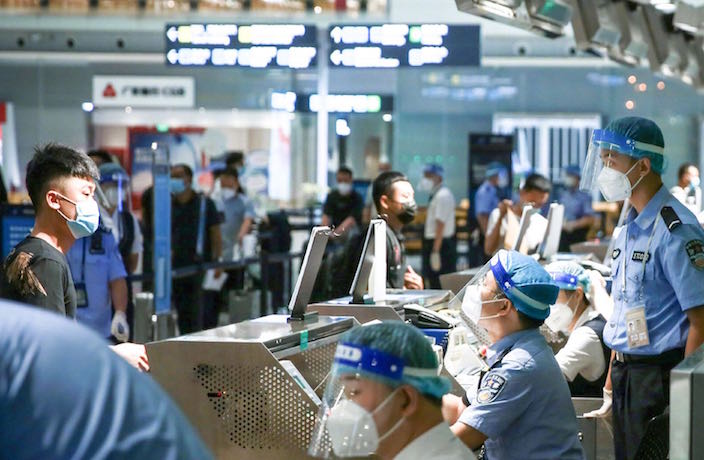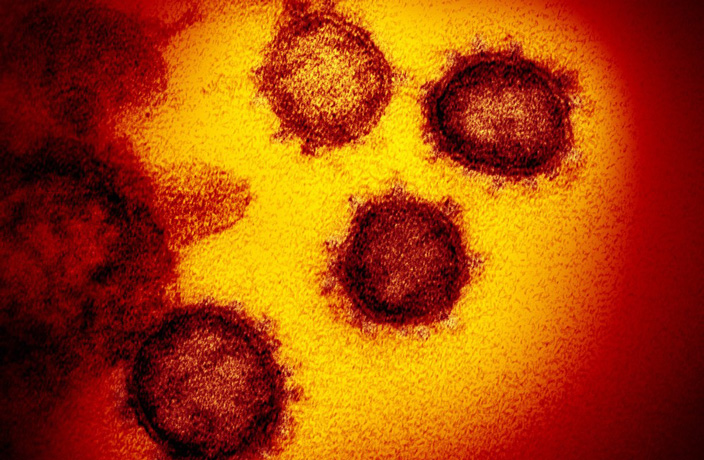China is a goldmine for news, whether it be waging a war on video game addiction (and winning) or a man who ran a marathon in less than four hours while smoking, there’s just too much going on in the Middle Kingdom!
From Nancy Pelosi visiting the region of Taiwan to the President of China meeting US President Joe Biden, it’s been a year of big meetings that have sent vibrations right across the globe.
On the lighter side, we’ve seen a number of relaxations to China’s ‘dynamic zero-COVID’ policy, the Winter Olympics and a rather important National Congress.
For this year’s Year in Review, we have compiled a list of the hottest news stories that you viewed on thatsmags.com and those that made huge international headlines. Enjoy!
January 18
Thousands of Hamsters Culled After COVID-19 Outbreak in Hong Kong

Hong Kong ordered the culling of thousands of hamsters and other small mammals after a COVID-19 outbreak was linked to a pet shop.
The decision was taken after an outbreak of the Delta variant linked to a worker in the Little Boss pet store on Causeway Bay, prompting officials to test hundreds of animals.
Eleven hamsters were found to have contracted the virus, leading officials to believe it may be a case of animal-to-human COVID-19 transmission. People who had recently purchased the furry creatures were ordered to report their new pets to health officials and get tested immediately.
Earlier in January, then Hong Kong chief executive Carrie Lam announced a travel ban from eight countries from January 8-21 to deal with the rise in infections.
January 28
China Unicom Banned in the US
The Federal Communications Commission (FCC) voted unanimously to ban China Unicom from operating in the US.
The US government cited national security and espionage concerns linked to the telecoms provider as the reason behind the decision.
The company was required to cease operations and services within 60 days.
China Unicom is the 14th largest telecommunications company in the world. In October 2021, China Telecom, the seventh largest telecom communications company also had its license to operate in the US revoked.
February 4
The Winter Olympics Opening Ceremony in Beijing

The 24th edition of the Winter Olympics started in Beijing, making China’s capital city the first to host both the Summer and Winter Olympics.
The opening ceremony was held in the iconic Bird’s Nest stadium which was originally built for the 2008 Olympics.
Due to the COVID-19 pandemic and China’s zero-COVID policy, no paying spectators, friends or family were present in the stands, however, foreign diplomats, team members and athletes were allowed to watch.
Russian President Vladimir Putin was one of the world leaders in attendance.
March 21
Guangzhou Flight Carrying 132 People Crashes into Guangxi Mountain

An airliner carrying 132 people from Kunming to Guangzhou crashed in Guangxi Zhuang Autonomous Region, South China.
All people onboard sadly lost their lives.
China Eastern Airlines Flight MU5735 went down in mountainous Teng County, Wuzhou, Guangxi, causing a fire to break out.
Initial reports from foreign media outlets stated that 133 people were on board, but Chinese media later confirmed that one lucky person didn’t board the flight.
February 20
2022 Beijing Winter Olympic Games Comes to a Close

After 16 days and 109 events, the Olympics ended on February 20, 2022, with Norway topping the leaderboard with 37 medals and the most gold medals (16).
China finished in third place, with a total of 15 medals, including nine golds and four silvers.
In China, Eileen Gu captured the hearts and minds of the nation when she became the youngest gold medalist in freestyle skiing. She finished the tournament with two golds and one silver medal.
April 4
Shanghai Extends Lockdown to Entire City
Shanghai extended its lockdown to the entire city to “test all its 26 million residents,” authorities said.
The lockdown was originally planned to be executed in two stages, with half of the city to be locked down from Monday, March 28 and the second half to be locked down four days later.
During the lockdown, residents had to work from home and all non-essential businesses were closed.
On April 3, the city reported 9,006 new cases of COVID-19.
April 20
No Abnormalities Found in Tragic Flight MU5735
The Civil Aviation Administration of China (CAAC) said that there were no technical irregularities or pilot errors that led to China Eastern Airlines Flight MU5735 crashing into the mountains of Guangxi on March 21.
The report also stated that the data from both black boxes had not yet been extracted. Investigators said that the boxes were badly damaged and that their content may be unsalvageable.
No conclusions as to what caused the crash or why it suddenly descended into the Guangxi Zhuang Autonomous Region, killing all 132 people on board, were offered.
The report, which was required to publish its findings within 30 days of the crash, was filed by the International Civil Aviation Organization. Only the summary was released to the public.
May 28
Heavy Rain and Flooding Hits Southern China
Rain lashed southern China towards the end of May, causing two buildings to collapse in Fujian province and eight people to lose their lives.
Elsewhere in the country, five people died and three went missing after flooding hit Yunnan province. The floods also damaged roads, bridges, telecommunications and power facilities in the province.
In Guangxi’s Xincheng county, five people, including three children were swept away by floodwaters.
June 1
Shanghai Lifts Lockdown Restrictions
On May 30, authorities in Shanghai announced that they would lift some of the COVID-19 measures in place on June 1, enabling China’s largest economy to begin to return to normal.
Residents were allowed to move freely around the city, some businesses reopened and public transport in some areas was able to resume.
"This is a day that we dreamed of for a very long time," Shanghai government spokeswoman Yin Xin told reporters.
Agreeing with Yin’s statement, many residents took to the streets shortly after midnight on June 1 to celebrate with friends, family and neighbors.
The measures came 65 days after authorities announced a planned two-stage lockdown at the end of March.
June 17
3rd Aircraft Carrier, the Fujian, Launches in Shanghai
China launched its new aircraft carrier, the Fujian. It is the first of its kind in the country to use electromagnetic catapults.
Previous carriers launched aircraft with ski jumps.
The Fujian is over 300 meters long and weighs over 80,000 tonnes.
June 28
China Cuts Quarantine Time for Overseas Arrivals to 7 Days

China further eased restrictions for overseas arrivals into the country, with news that seven-day centralized quarantine plus three-day ‘health monitoring’ at home (the ‘7+3’ policy) would become the norm.
The new policy was noted in the ninth edition of the State Council’s report on COVID-19 epidemic prevention and control.
Certain cities on the Chinese mainland had previously announced that they would implement a ‘7+7’ for some overseas arrivals.
There are also reductions in quarantine time for close contacts and secondary close contacts of confirmed COVID-19 cases.
July 4
Shenzhen Becomes China’s First City to Allow Death with Dignity
Shenzhen became the first city in China to pass legislation allowing critically ill patients to refuse “excessive life-saving treatment,” according to Red Star News.
Changes to Article 78 of Medical Regulations of the Shenzhen SEZ now allow critically ill patients to refuse treatments that will extend or save their lives.
Should a patient refuse the treatments, hospitals are now required by law to abide by their wishes.
Furthermore, if a patient stated that they did not want to receive life-extending or life-saving treatment before they entered a state where they were unable to make their own decisions, family members and medical professionals have to respect their decision in accordance with the new law.
This is the first time people in China have been afforded the right to die under specific circumstances, but it is not to be confused with euthanasia, which gives people the right to end their own life.
July 18
China Sweats Under Hottest Heat Wave Ever
In Shanghai, temperatures reached 40.9 degrees Celsius on July 10, the highest recorded since 1873.
Elsewhere in the country, weather stations in Zhejiang and Jiangsu provinces recorded temperatures of over 40 degrees. Meanwhile, in Sichuan, Shanghai, Zhejiang, Jiangsu, Henan, Hebei among other provinces, high-temperature warnings of over 40 degrees were in place for 10 consecutive days.
From the beginning of June until July 13, only Heilongjiang and Liaoning provinces in Northeast China escaped high-temperature warnings.
So, why the record-breaking heat?
Yuan Yuan is a director at China’s National Climate Center, an organization responsible for analyzing climate change patterns and the subsequent potential occurrence of natural disasters.
Yuan explains that in June 2022, the global average temperature rose by 0.4 degrees, the highest rise since 1979. Recent extreme heat in many places in the northern hemisphere has been caused by a combined strengthening of high pressure over the hemisphere’s subtropical region, including across the western North Pacific subtropical belt and the Atlantic high-pressure belt.
July 22
China’s Population Expected to Shrink
The Chinese population is projected to shrink this year for the first time since the Great Famine that took place between 1959 and 1961.
China is currently the world’s most populous country, with a population of more than 1.4 billion people.
However, according to China’s National Bureau of Statistics, the country’s population increased by only 480,000 between 2020 and 2021. In contrast, the annual population growth a decade ago was 8 million.
The rapidly decreasing fertility rate has been attributed to a number of factors, including people having become used to small families, the rising cost of living, increasing marriage age (which means women are giving birth later in life and having fewer children) and strict COVID-19 measures.
Based on the current trend, the annual fertility rate is forecast to drop from 1.15 to 1.1 from now to 2030... and is forecast to remain there. The Shanghai Academy of Social Sciences is anticipating an annual decline of 1.1% in the Chinese population, resulting in a population of only 587 million in 2100.
August 2
US House Speaker Makes Provocative Visit to Taiwan Region
US House Speaker Nancy Pelosi visited China’s Taiwan despite strong opposition from China and warnings from US President Joe Biden.
At the same time, many governments and international organizations around the world issued statements expressing their adherence to the one-China policy and opposition to the US actions against China’s sovereignty and territorial integrity.
Starting on the evening of August 2, the Eastern Theater of the Chinese People’s Liberation Army successively carried out a series of joint military operations around Taiwan Island.
Joint sea and air exercises were conducted in the northern, southwestern and southeastern sea airspace of Taiwan Island, long-range live fire was conducted in the Taiwan Strait, and regular guided fire tests were organized in the eastern waters of Taiwan Island.
From August 4-7, the People’s Liberation Army also conducted military exercises and organized live firing.
August 22
Macao Opens Up to Foreigners on the Chinese Mainland
Foreigners who reside on the Chinese mainland could begin visiting China’s Macao Special Administrative Region, without the need for prior authorization from the Region’s health authorities.
The announcement was made via the Macao Special Administrative Region Health Bureau on August 22.
September 5
Earthquake Rocks Sichuan Province, 65 Confirmed Deaths

At 12.52pm on September 5, a 6.8-magnitude earthquake hit Luding county, Ganzi prefecture, Sichuan province.
Chinese state media reported that 65 people had died, 248 were injured and 12 were missing.
Of the confirmed deaths, 37 occurred in Ganzi prefecture and 28 in Ya’an.
The earthquake struck at a depth of 10 kilometers, disrupted telecommunications and caused landslides leading to serious damage.
Luding, the quake’s epicenter, is a small mountain town located roughly 226 kilometers southwest of Chengdu, the provincial capital.
Tremors were felt as far as the provincial capital and neighboring city Chongqing.
Chengdu’s 16 million residents were under lockdown due to the recent outbreak of COVID-19 in the area and were prohibited from leaving their homes and or residential communities.
Previously in June, a 6.1-magnitude earthquake hit Lushan county, Ya’an, Sichuan province in southwest China killing at least four people and injuring 14, Global Times reported.
It was also reported that two earthquakes struck in a five-minute window.
September 20
China Modifies ‘Don’t Touch Foreigner’ Advice After Backlash

Wu Zunyou, the Chief Expert of Epidemiology at China’s Center for Disease Control and Prevention, modified the five suggestions he put forward for preventing the spread of monkeypox.
Originally, the first of five suggestions said that people should not “have direct skin-to-skin contact with foreigners.”
This has now been adapted to “Do not have close skin-to-skin contact with foreigners who have recently (within the last three weeks) come from a monkeypox epidemic area outside China and may be infected with the disease.”
Wu put forward the five suggestions after the Chinese mainland reported its first monkeypox case on September 16, after an inbound traveler to the southwestern municipality of Chongqing tested positive for the virus.
September 23
Tangshan BBQ Thug ‘Cries and Apologizes’ in Court Hearing

One of the culprits behind the infamous ‘Tangshan BBQ incident’ broke down in court and “cried bitterly and apologized to the country and to Tangshan.”
The man in question, Chen Jizhi was given a fixed prison sentence of 24 years and was fined RMB320,000.
Twenty-seven other individuals were also charged with prison sentences ranging from six months to 11 years, while fines ranged from RMB3,000 to RMB130,000.
Chen and six other individuals were ordered to pay medical and other costs to the four victims of the BBQ incident.
The incident took place on June 10, 2022, at a barbecue restaurant in Lubei district, Tangshan.
CCTV footage showed a man attempting to flirt with a female diner and touch her arm. When the woman rejected his advances, a group of men dragged her outside and viciously beat her.
Of the four women attacked, two were hospitalized; one of the women, surnamed Wang was pictured with serious injuries.
The case not only sparked discussion about violence against women but also shed light on organized crime in Tangshan and neighboring cities.
September 23
Hong Kong Shuts Isolation Hotels, Implements ‘0+3’ Policy

Hong Kong’s Chief Executive, John Lee announced that the Special Administrative Region (SAR) would abolish hotel quarantine for overseas arrivals and implement a ‘0+3’ system.
This meant that people heading to Hong Kong from abroad or the Chinese mainland would no longer need to undergo mandatory hotel quarantine, but instead three days of health monitoring at home.
During the three days of at-home monitoring, health codes would be amber and residents were to conduct three rapid antigen tests (one on each day). Codes would only turn blue when the third test had been completed.
Unlike on the Chinese mainland, in Hong Kong an amber code on the “Leave Home Safe” app (Hong Kong’s health code) still allows people to use public transport, go to the office and shop at markets and malls.
However, an amber code does not allow people to partake in any activity where a mask isn’t required, such as gyms, restaurants and bars.
October 22
National Party Congress Draws to an End
The 20th National Congress of the Communist Party of China (CPC) concluded on October 22.
During the Congress, the “three major events over the past 10 years that are of major realistic significance and far-reaching historical significance” were reviewed.
The report passed by the Congress says, “From this day forward, the central task of the Communist Party of China will be to lead the Chinese people of all ethnic groups in a concerted effort to realize the Second Centenary Goal of building China into a great modern socialist country in all respects and to advance the rejuvenation of the Chinese nation on all fronts through a Chinese path to modernization.”
October 26
China Creates Aerosolized Booster Shots for Mass Vaccination
Shanghai became the first city in China to use the country’s aerosolized adenovirus type-5 vector-based COVID-19 vaccine (Ad5-nCoV) booster shot on October 25, 2022, as per Global Times.
The announcement was made via the Shanghai municipal government’s WeChat account, which stated the vaccination would be available for use from October 26.
Reservations opened to all local adults who had already received two doses of China’s COVID-19 vaccine (Sinopharm and Sinovac Biotech) or one shot of CanSino Biologics (CanSinoBIO)’s intramuscular Ad5-nCoV more than six months prior.
In their announcement, the Shanghai government stated, “Receiving a booster shot is an effective method to enhance the protection effectiveness and prolong the protection duration of vaccines,” as reported in Global Times.
November 22
Video Game Addiction Cured Among China’s Kids
On November 22, 2022, the China Game Industry Research Institute published the 2022 China Game Industry Progress Report on the Protection of Minors. The report concluded that Chinese minors’ addiction to online games had largely been solved.
According to the report, the number of minors who spend less than three hours per week playing online games has grown to more than 75%.
Last year, Xinhua reported that China’s strictest regulations on minors playing video games were announced to combat gaming addiction.
It was also reported that World of Warcraft, Overwatch and Diablo 3 were some of the Activision Blizzard video games that will disappear from the Chinese gaming market in January 2023.
NetEase, which provides access to the games in China, has failed to renew its 14-year-old licensing agreement, as per the BBC.
November 11
China Relaxes Anti-Epidemic Measures
China made a number of significant changes to the country’s COVID-19 prevention and control measures, including reducing quarantine time for overseas arrivals to 5+3 (five days in a hotel and three days of at-home health monitoring).
The measures also saw the circuit breaker (where a temporary ban is put on flights from a foreign country if a passenger on said flight route tests positive for COVID-19) on flights lifted. Passengers traveling to China now only need one negative PCR test taken within 48 hours of departure (previously two).
There were also a number of changes to the country’s domestic COVID-19 policies, including removing mid-risk areas from the three-tiered system and reducing the number of days an area has to have zero cases before it is downgraded from high- to low-risk.
Close contacts would only need to quarantine under the ‘5+3’ model, while the country no longer pursued ‘secondary close contacts.’
November 30
Former Chinese Leader Jiang Zemin Dies Aged 96

According to a statement, Jiang passed away in Shanghai at 12.13pm on Wednesday, November 30, due to leukemia and multiple organ failure.
The announcement was made by the Central Committee of the Communist Party of China (CPC), the Standing Committee of the National People’s Congress of the People’s Republic of China (PRC), the State Council of the PRC, the National Committee of the Chinese People's Political Consultative Conference, and the Central Military Commissions of the CPC and the PRC.
Jiang was born on August 17, 1926 in Yangzhou, Jiangsu province.
He served as General Secretary of the CPC from 1989-2002, as Chairman of the Central Military Commission from 1989-2004, and as President of the PRC from 1993-2003.
He presided over key developments during China’s Reform and Opening Up era, including China joining the World Trade Organization (WTO) in 2001.
December 4
Chinese Astronauts Return to Earth Following Six-month Mission

Three Chinese astronauts successfully returned to Earth after completing a 6-month mission that China’s space agency has called a “complete success” aboard the country’s space station.
The crew embarked on their journey to the country’s Tiangong space station on June 5.
They landed on board the Shenzhou-14 spacecraft on Sunday, December 4, 2022, in the Inner Mongolia Autonomous Region.
Crew commander Chen Dong and teammates Liu Yang and Cai Xuzhe told state broadcaster CCTV that they felt well after landing.
The landing capsule landed at circa 8pm local time and staff at the landing site carried the crew out of the capsule.
After undocking from the Tiangong space station, the journey back to earth took roughly nine hours.
December 7
No More Health Codes or Centralized Quarantine

China's National Health Commission outlined 10 new strategies for dealing with COVID-19, most notably the country removed all health code scanning, mass testing sites and centralized quarantine facilties.
In short, the new policies are:
Risk Areas Parameter Confined to Buildings and Specific Floors
No more Health Code and COVID Test Checks
Infected Persons Can Isolate at Home
Implement ‘Quickly Lockdown, Quickly Release’
Ensure the Public Has Access to Medicine
Vaccinate the Elderly
Strengthen the Health Status of Key Populations and Classification Management
Ensure the Normal Operation of Society and Basic Medical Services
Strengthen COVID-related Security
Further Optimize the Epidemic Prevention and Control Work in Schools
December 13
China’s Travel Code to be Obsolete from Midnight

At midnight on December 12, 2022, China’s Travel Code (通信行程卡) announced on their official WeChat page that from the following day (December 13), they will suspend operations indefinitely.
The official statement reads:
“To thoroughly implement the decision-making deployment of the Party Central Committee and the State Council on further optimizing the prevention and control measures of COVID-19, and scientifically and accurately implement prevention and control work, according to the relevant requirements of the comprehensive group of the joint prevention and control mechanism of the State Council, the Travel Code will officially stop service from midnight on December 13.
“Travel Code inquiry channels such as text messages, web pages, WeChat and Alipay mini-programs and APPs will all go offline simultaneously.”
The Travel Code was previously used to inform venues, such as public places, landmarks, eateries, hotels and elsewhere whether someone had traveled to a high-risk area over the last seven days.
Venues could refuse entry based on one’s travel history.
The code previously showed a person’s travel history over the last 14 days and had a star function, which meant that although the person hadn’t been to a high-risk area, they had been in a city that had such areas.
December 12
Hong Kong Removes Quarantine Requirements for Overseas Arrivals

Hong Kong removed the requirement for all overseas arrivals to undergo three days of health monitoring (‘0+3’) when they arrive in the Special Administrative Region (SAR), Chief Executive John Lee said in a press conference on Tuesday, December 12, 2022.
The city implemented ‘0+0,’ meaning no COVID-19 restrictions are in place for overseas arrivals.
Previously, people from abroad arriving in Hong Kong would be given an amber health code on the SAR’s LeaveHomeSafe app (similar to China’s various health codes).
Anyone with an amber code was prohibited from going to restaurants or participating in events where a face mask wasn’t required (going to a gym or bar, for example). However, they could still take public transport and stay in hotels around the city.
Now, people who test negative upon arrival to the SAR will be given a blue code, be able to enter restaurants and participate in all maskless activities.
December 14
China’s COVID Numbers No Longer Include Asymptomatic Patients

China decided to no longer include asymptomatic carriers of COVID-19 in its daily COVID numbers.
The decision came into effect on Wednesday, December 14, 2022, as announced by the National Health Commission of the People’s Republic of China.
According to China News Net (中国新闻网), the decision to exclude asymptomatic cases from the data stems from the fact that so many neither partake in nucleic acid testing, nor are admitted to a hospital; in short, tracing asymptomatic patients is too difficult in the context of China’s newly relaxed anti-epidemic policies.
Not long after the announcement, China said it would do away with daily COVID-19-related updates altogether.
[Cover image via That's]





















0 User Comments